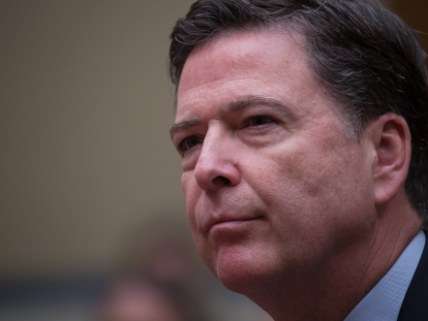FBI's Comey Proposes an 'Adult Conversation' About Giving the FBI Whatever They Want
Two words from a government official to dismiss decades of expertise on encryption.


When a powerful, unelected federal official says we need to have an "adult conversation" about the limits of federal authority as contrasted with the civil liberties of the people he allegedly works for, hold on to your butts.
Whenever somebody declares the need for an "adult conversation" in the first place, they are suggesting that one hasn't already been happening, and often accomplishes little but to raise the hackles. It is a deliberate insult against those with opposing views. In this particular case, the person invoking the term is FBI Director James Comey, and it's pretty much directed at the entire tech sector and privacy advocates who have been pushing back (for decades) against government attempts to tamper with and weaken encryption.
There's something remarkably telling about the man saying we need to have an "adult conversation" on encryption limits primarily because he can't just get whatever he wants. Isn't that the child's argument? The government wants this information. Give us this information!
Of course, as always, it's couched in terms of the alleged threat of the Internet going "dark" and federal investigators worried they're not able to track down alleged criminals and terrorists. Comey complained about it at a tech symposium today. The Associated Press reports:
"The conversation we've been trying to have about this has dipped below public consciousness now, and that's fine," Comey said. "Because what we want to do is collect information this year so that next year we can have an adult conversation."
The American people, he said, have a reasonable expectation of privacy in houses, cars and electronic devices — but he argued that right is not absolute.
"With good reason, the people of the United States — through judges and law enforcement — can invade our public spaces," Comey said, adding that that "bargain" has been at the heart of the country since its inception.
This is what he thinks is an "adult conversation." While Comey wants to present this is a reasonably as possible, recall that when they found a phone in the possession by a terrorist that was protected with a password, what the Department of Justice thought was the reasonable, adult response was to try to use the courts to conscript Apple and to actually force it to compromise its own security systems to give the government access to the phone's contents. The government wants things! Give the government those things! This is the "adult conversation" Comey's side is having right now.
No, privacy is not absolute, but just because they government has the authority to pursue information related to crimes doesn't mean they're guaranteed access to it. I'll dredge up an old example: A suspect may take a box containing evidence to a crime and bury it somewhere out in the desert. The government absolutely has the authority to try to track down that evidence and use any number of tools to do so. But they can't order the desert to cough it up for them or command some desert experts to track it down for them (though they can certainly hire them).
The "adult conversation" that's actually already happening is trying to get people like Comey to understand that there's no magical system where the Department of Justice (or any other government entity) can get access to information to encrypted data that doesn't leave the whole system vulnerable.
The "adult conversation" is about trying to get authoritarian senators like Dianne Feinstein (D-Calif.) and Richard Burr (R-N.C.) to understand that the legislation they wrote to order tech companies to assist the government in cracking their own security was so bad—so childish, in fact—that it's impossible to imagine any tech or privacy-minded adult trusting what they'll suggest next. The "adult conversation" is "white hat" hackers showing how easy it is for a mistake to compromise the data of millions of computer users. The "adult conversation" is about understanding that oppressive governments will use these tools to punish and imprison their own citizens.
If Comey wants to have an "adult conversation," we should maybe set encryption aside for now and talk about the absurdity of our government-sponsored drug war that will never, ever succeed any more than any other prohibition has ever succeeded and why the government still clings to the illogical, absurd (and childish) fantasy that illegal drug use can somehow be halted. Maybe if we had that "adult conversation" and brought it to its logical conclusion (ending this foolish war), we could actually then go back and determine how important it actually is for the FBI to be able to defeat encryption. Evidence shows the relentless drive to perpetuate this drug war is playing a major role in this encryption fight, not terrorism, as the feds would have us believe.
For more "adult conversation," read Andrea Castillo's piece today about how the feds clearly prioritize the ability to snoop on us over the need to protect us from hackers.


Show Comments (58)